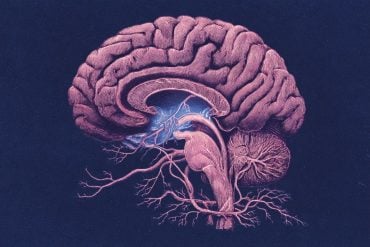Summary: New research reveals that men who carry two copies of a common genetic variant in the HFE gene are more than twice as likely to develop dementia, while women with the same variant are not affected. The variant, known as H63D, is linked to haemochromatosis and is present in about 1 in 36 people.
Interestingly, researchers found no direct connection between elevated iron levels and dementia risk, pointing instead to other biological mechanisms like inflammation or neural damage. These findings could guide more personalized dementia prevention strategies, particularly for men carrying this gene.
Key Facts:
- Sex-Specific Risk: Men with two copies of the H63D gene variant have double the dementia risk; women do not.
- Beyond Iron Levels: The increased risk appears unrelated to iron in the blood, suggesting other pathways are involved.
- Clinical Potential: Routine HFE testing could help identify high-risk men for earlier intervention.
Source: Curtin University
New research has found that men who carry a common genetic variant are twice as likely to develop dementia in their lifetime compared to women.
The research, published in Neurology, used data from the ASPirin in Reducing Events in the Elderly (ASPREE) trial to investigate whether people who had variants in the haemochromatosis (HFE) gene, which is critical for regulating iron levels in the body, might be at increased risk of dementia.

Co-author Professor John Olynyk, from the Curtin Medical School, said one in three people carry one copy of the variant, known as H63D, while one in 36 carry two copies.
“Having just one copy of this gene variant does not impact someone’s health or increase their risk of dementia. However, having two copies of the variant more than doubled the risk of dementia in men, but not women,” Professor Olynyk said.
“While the genetic variant itself cannot be changed, the brain pathways which it affects – leading to the damage that causes dementia – could potentially be treated if we understood more about it.”
Professor Olynyk said further research was needed to investigate why this genetic variant increased the risk of dementia for males but not females.
“The HFE gene is routinely tested for in most Western countries including Australia when assessing people for haemochromatosis – a disorder that causes the body to absorb too much iron. Our findings suggest that perhaps this testing could be offered to men more broadly,” Professor Olynyk said.
“While the HFE gene is critical for controlling iron levels in the body, we found no direct link between iron levels in the blood and increased dementia risk in affected men.
“This points to other mechanisms at play, possibly involving the increased risk of brain injury from inflammation and cell damage in the body.”
Co-author Professor Paul Lacaze, from Monash University, said the findings could help improve outcomes for people at risk of developing dementia.
“More than 400,000 Australians are currently living with dementia, with around a third of those being men. Understanding why men with the double H63D variant are at higher risk could pave the way for more personalised approaches to prevention and treatment,” Professor Lacaze said.
“This study is a great example of how diverse Australian research groups and universities can collaborate effectively to learn more about these progressive diseases and ultimately improve health outcomes for people around the world.”
The ASPREE trial was a double-blind, randomised, placebo-controlled trial of daily low-aspirin in 19,114 healthy older people in Australia and the USA. Primarily undertaken to evaluate the risks versus benefits of daily low-dose aspirin in this cohort, it created a treasure trove of healthy ageing data that has underpinned a wealth of research studies.
The research was a collaboration between Curtin University, Monash University, The University of Melbourne, The Royal Children’s Hospital, Murdoch Children’s Research Institute and Fiona Stanley Hospital.
About this genetics and dementia research news
Author: Yasmine Phillips
Source: Curtin University
Contact: Yasmine Phillips – Curtin University
Image: The image is credited to Neuroscience News
Original Research: Closed access.
“Haemochromatosis genotypes and incident dementia in a prospective study of older adults” by John Olynyk et al. Neurology
Abstract
Haemochromatosis genotypes and incident dementia in a prospective study of older adults
Background and Objectives
Variants in the homeostatic iron regulator (HFE) gene are prevalent among individuals of European ancestry and have been linked to an increased risk of dementia. This study aimed to evaluate the effects of HFE p.Cys282Tyr and p.His63Asp variants on serum ferritin levels and the incidence of dementia in a cohort of initially healthy older adults.
Method
This prospective longitudinal study used data from the Aspirin in Reducing Events in the Elderly trial. Participants had no history of cardiovascular disease, dementia, or cognitive decline at enrollment. Genotyping for HFE p.Cys282Tyr and p.His63Asp variants was conducted using microarrays, and baseline serum ferritin concentrations were measured in peripheral blood samples.
Dementia diagnoses were confirmed by an adjudication committee over a median follow-up of 6.4 years. Associations were evaluated using Cox proportional hazards models adjusted for related covariates.
Results
The study included 12,174 unrelated, healthy participants of European ancestry aged 70 years or older, comprising 5,583 men (45.9%) and 6,591 women (54.1%). The median age was 73.7 years (interquartile range [IQR]: 71.6–76.9) for men and 73.9 years (IQR: 71.7–77.5) for women.
Compared with the wild-type group, men with p.Cys282Tyr+/+ (p = 0.048) and p.Cys282Tyr+/p.His63Asp + genotypes (p < 0.001) had significantly higher baseline ferritin levels. Women with p.His63Asp+/+ (p = 0.015) and p.Cys282Tyr+/p.His63Asp+ (p < 0.001) genotypes also exhibited elevated ferritin levels. No significant association was observed between baseline serum ferritin levels and dementia risk.
However, men with p.His63Asp+/+ genotype had a significantly higher risk of incident dementia (adjusted hazard ratio = 2.39, 95% CI 1.25–4.57, p = 0.009) compared with those without HFE variations. This association was not observed in women.
Discussion
Among initially healthy older adults, HFE p.His63Asp homozygosity was associated with a higher risk of incident dementia in men but not women. These findings highlight a potential sex-specific genetic risk factor for dementia and warrant further research into the underlying mechanisms linking p.His63Asp and dementia.






